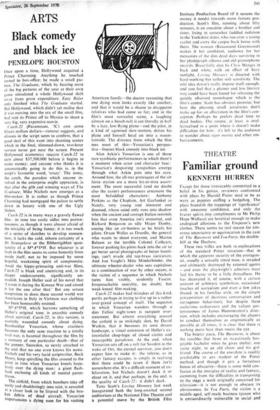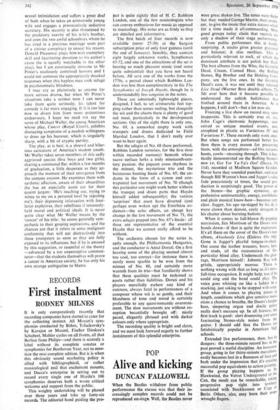THEATRE
Familiar ground
KENNETH HURREN
Except for those irrevocably committed to a belief in his genius, reviewers confronted with plays by Harold Pinter tend to be as wary as puppies sniffing a hedgehog. The plays brandish the trappings of 'significance' with awesome confidence, and only the braver spirits (my compliments to Mr Philip Hope-Wallace) are heretical enough to make analogical allusions to the Emperor's new clothes. There seems no real reason for tim- orous uncertainty or equivocation in the case of The Basement and Tea Party, the double- bill at the Duchess.
These two trifles are both re-explorations of the standard Pinter situation—that in which the apparent security of the protagon- ist, usually a sexually timid man, is invaded and ultimately destroyed by external agents —and even the playwright's admirers must feel his theme to be a little threadbare. He has decorated it, of course, with a certain amount of arbitrary symbolism, occasional touches of surrealism and even a few jokes (based, in his familiar style, on the simple juxtaposition of decorous conversation and outrageous behaviour); but despite these audacious endeavours and the valiant por- tentousness of James Hammerstein's direc- tion, which includes encouraging the players to conduct themselves as enigmatically as possible at all times, it is clear that there is nothing more here than meets the eye.
The briefer piece. The Basement, is about the troubles that beset an incautiously hos- pitable bachelor when he gives shelter, one rainy night, to an old chum and his girl friend. The course of the anecdote is readily predictable to any student of the Pinter method. and though it gets a fortuitous bonus of obscurity—there is some mild con- fusion in the interplay of reality and fantasy, stemming from the difficulties in transposing to the stage a work originally conceived for television—it is not enough to obscure its obviousness. In Tea Party, the victim is a middle-aged, self-made business tycoon who is extraordinarily vulnerable to social and sexual intimidation and suffers a great deal of both when he takes an aristocratic young wife and engages a provocatively seductive secretary. His security is also threatened by the predatory suavity of his wife's brother, and even the two awful schoolboys whom he has sired in a previous marriage seem part of a sinister conspiracy to unseat his reason. Donald Pleasence plays him with exemplary skill and fascinating devotion to his author's cause (he is equally watchable in the other play), but I am emotionally immune to Mr Pinter's studiously contrived horrors and I could not summon the appropriately shocked responses when this hapless man took refuge in psychosomatic blindness.
I may cry as plaintively as anyone for more serious drama, but when Mr Pinter's situations take a serious turn I can never take them quite seriously; his talent for comedy is far more engaging. If it is too late now to divert him from more pretentious endeavours, I hope we need not say the same of Michael Weller, the young American whose play, Cancer (Royal Court), exhibits dismaying symptoms of a modish willingness to dress up his humour, which is singularly sharp, with a bit of cryptic parsley.
The play. at is best, is a shrewd and hilar- ious caricature of America's student youth. Mr Weller takes seven members of this sadly aggrieved species (five boys and two girls), sharing a communal flat, within a few months of graduation, a little desperate as they ap- proach the moment of their emergence from the campus cocoon. He examines them with sardonic affection, aware of their absurdities (he has an especially acute ear for their quaint jargon: 'He's reaching out, trying to relate to me on a personal level by rejecting me'), their depressing infatuation with four- letter expletives, their rebellious if tenuously- held moral and political ideals. It is never quite clear what Mr Weller means by the 'cancer' of his title: he seems generally sym- pathetic to their groping aspirations, and the chances are that it refers to some malignant conformity that will eat destructively into these youngsters as soon as they are fully exposed to its influences; but if he is amused by this suggestion, or resentful of the theory —advanced by a not unperceptive commen- tator—that the students themselves will prove a cancer in American society, he has only his own strange ambiguities to blame.



































 Previous page
Previous page